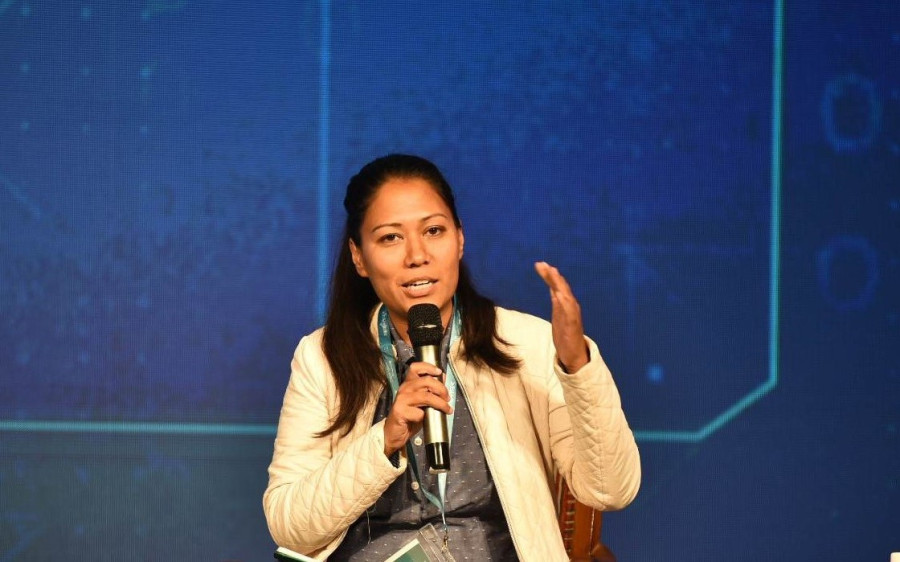Columns
Taming of the shrews
Even in politics, the men in charge prefer women who embody traditional femininity.
Sucheta Pyakuryal
The collective indignity bestowed on political women, from Shailaja Acharya to Sumana Shrestha, by political patriarchs needs immediate redress. In today’s time, when power has ceased to be a zero-sum game and good leadership is synonymous with collaboration, the traditionally inclined old men clumsily spewing patriarchal narratives make civilised citizens extremely uncomfortable. Political women with independent political personhood have always been problematic to traditional men. Sahana’s grit, Shailaja’s impatience, Binda’s blatant feminism and Sumana’s formidability seem to have threatened those with the traditional bent of mind. At least two generations of strong, opinionated women have been sidelined or ousted because they did not fit into the mould of patriarchal party politics. It almost seems like the traditional men view them as political “shrews” who, like in the famous Shakespearean play The Taming of the Shrew, need to be “tamed”, cut to a size that is desirable to political patriarchy.
Until not long ago, the concept of a “good woman” stemmed from feminine subservience and obedience. Women’s personhood was stunted through intense psychological conditioning that can be traced back to the origins of the state and society. A woman was told how her family’s honour rested on her good character. She was introduced to a heavy burden of feminine morality at an early age. With stories being fed about good women versus bad, patriarchy was very successful in grooming girls to grow up to be good women and obedient keepers of their family’s honour. Subservience was the prerequisite to being a good woman. A good woman was anything but defiant, and if by chance she did get tempted to disobey and defy the norms, she paid a hefty price. This “truth” was continuously fed into the feminine psyche, mostly through religious texts and scriptures. These women were duly punished in the ancient scriptures and medieval texts crafted and propagated by men.
Vyaas wrote the story of how Draupadi was dragged by her hair and abused publicly because she had made fun of Duryodhana, leading to the great war between the Pandava and Kaurava brothers. Mother Mary was glorified as a virgin, while Mary Magdalene was vilified as a “loose” woman and had to be rescued. Sita’s disobedience tempted Ravana and caused much grief to Lord Ram. Eve disobeyed the Lord and ate the apple only to be the cause of Adam’s banishment. Khadija was a strong woman and a successful merchant before she married the Prophet, but she submitted herself to him and became his first disciple. In addition, the annual celebration of Swasthani Vrata Katha revered the ideal woman in the form of Goma Brahmani, who never protested, tolerated every injustice inflicted against her personhood. The idea of feminine morality has been strongly correlated with women’s socio-cultural subservience, religious conformity, psychological and economic fragility and physical docility. Even in politics, the men in charge prefer women who embody traditional femininity.
However, here lies the problem: The idea of moral, subservient women clashes with the essence of equality and freedom propounded by the Universal Declaration of Human Rights. Women who have learned the freedoms cannot unlearn them. Today, several women in politics are highly qualified, independent, articulate and honest. They live the most painful existence because the unlearning of patriarchal values has already taken place within them, and they have a fully developed sense of personhood, which, however, is repeatedly obliterated by their party men or other political men who still operate by the patriarchal rules. Strong, independent, ethical women are repeatedly denied space in the party’s leadership.
Educated, dignified, honest, resolute, independent and opinionated, Shailja Acharya was often ridiculed for her “short temper” and “moods”. In UML’s case, Sahana’s leadership in the inter-party women’s caucus irked her party men. An economist by training, she was more qualified than most men in her party, but her commitment to the larger political sorority was perceived as defiance; therefore, a covert “cutting to size” was practised against her as well.
Narratives are created to invalidate women as viable leaders. These days, the “tamings” have become more overt. Binda Pandey, one of the handful of qualified women inside UML, was denied an election ticket, and the insider quickly pointed out that her “attitude” killed her prospects. The same has been the case with Shiva Maya Tumbahamphe, Kamala Panta, Shashi Shrestha, and others. Women’s recruitment, retention and promotions in parties seek obedient, subservient “yes-women” who do not have to be “tamed”.
The latest “taming” attempt, however, appears much more menacing than the past. A woman with an ivy-league education, who speaks the global language, wears gender-neutral clothing, questions the old guards about procedural gaps, carries her own bags, drives her own car and has managed to keep herself out of the clout-centric politics so far, must irk the political retainers quite intensely to receive such blatant, overt attacks regarding her personal choices: From her clothing to her life partner. KP Oli has tried dismantling Sumana Shrestha’s political legitimacy and citizenship by calling Nepal her maita. The chauvinism that drips from Oli’s statement is disgustingly archaic, feudal and regressive for a leader of his stature.
Bringing Shrestha into the helm of political give-and-take does not seem to have worked; if it had, Oli would not have had to start “taming” her. If she was unapologetically vocal as a member of the opposition, she seems adamant as a minister to fix the portfolio given to her. Maybe it is her “audacity” to fix the system at the ministry that has somehow miffed the old guard like Oli. His recent rants, aimed to paint her as a frivolous, westernised young woman whose political journey is a mere fluke, scream his intense insecurities. If that is indeed the case, then maybe Sumana Shrestha is doing something right, and we need more “shrew” muckrakers like her.




 16.16°C Kathmandu
16.16°C Kathmandu















